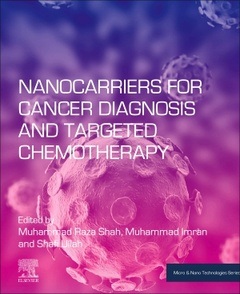Description
Nanocarriers for Cancer Diagnosis and Targeted Chemotherapy
Micro and Nano Technologies Series
Authors: Shah Muhammad Raza, Shah Muhammad Raza, Imran Muhammad, Imran Muhammad, Ullah Shafi, Ullah Shafi
Language: English
Subject for Nanocarriers for Cancer Diagnosis and Targeted Chemotherapy:
177.10 €
In Print (Delivery period: 14 days).
Add to cart310 p. · 19x23.3 cm · Paperback
Description
/li>Contents
/li>Readership
/li>Biography
/li>Comment
/li>
Nanocarriers for Cancer Diagnosis and Targeted Chemotherapy reviews the principles and applications of nanocarriers for targeted drug delivery. Drug targeting involves active and passive strategies that exploit both the use of ligands for interactions and the physical and chemical properties of nanocarriers and micro-environments at target sites. Multidrug resistance and adverse side effects associated with anticancer drugs have attracted greater scientific attention and led formulation scientists to specifically target these drugs to target sites. Nanocarriers like liposomes, niosomes, gold nanorods, carbon nanotubes, and micelles are discussed for the delivery of drugs to specific disease sites.
This is an important reference source for researchers in the biomedical and biomaterials fields who want to gain an understanding on how nanotechnology is used for earlier diagnoses and more effective cancer treatment.
Muhammad Imran is a graduate student and based at the International Center for Chemical and Biological Sciences, H.E.J. Research Institute of Chemistry University of Karachi, Pakistan.
Shafi Ullah is a graduate student and based at the International Center for Chemical and Biological Sciences, H.E.J. Research Institute of Chemistry University of Karachi, Pakistan.
- Explores the fundamental principles of drug targeting through different nano-carriers, highlighting major applications
- Shows how the use of nanocarriers is leading to quicker cancer diagnosis and more effective treatment
- Discusses the major challenges of using nanocarriers for drug delivery and assesses how to overcome these barriers




